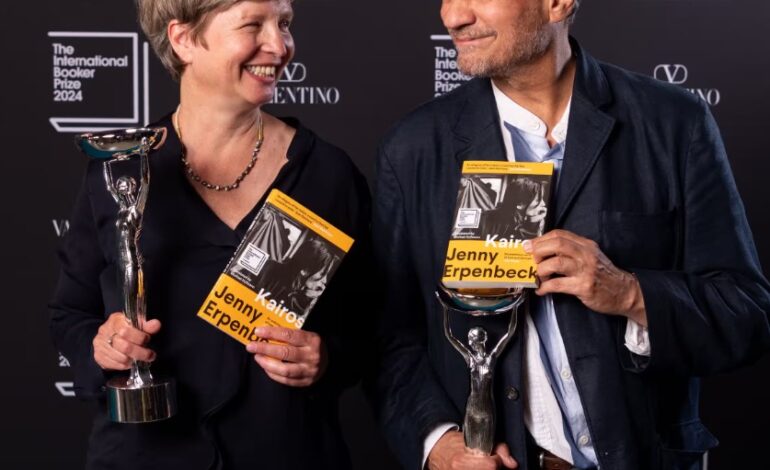Jenny Erpenbeck on Her International Booker Winner ‘Kairos’: ‘It Was High Time I Told Our Stories

“What is a ‘no-brainer’?” the German novelist Jenny Erpenbeck asks translator Michael Hofmann. It’s the morning after they’ve jointly won the International Booker Prize, and Hofmann has just used the term to describe the judges’ decision to award the prize to Erpenbeck’s latest novel, Kairos, which he translated.
However, back in Germany, the novel wasn’t so unanimously celebrated. Despite Erpenbeck’s status as one of Germany’s most esteemed novelists, Kairos wasn’t shortlisted for either of the country’s major literary awards. Now, as the first German author to win the International Booker since its inception nearly a decade ago, Erpenbeck has shaken up the German literary scene. “They are kind of panicking,” she laughs.
At 57, Erpenbeck has written only four novels, starting with her acclaimed debut, Visitation, in 2010 (all of which have been translated into English). She is frequently mentioned during Nobel Prize discussions, and the New York Times recently hailed her as “among the most sophisticated and powerful novelists we have.” Her second novel, The End of Days, about a Jewish woman born in Galicia in 1900, won the Independent Foreign Fiction Prize in 2015. Her third, Go, Went, Gone, which explores the lives of African refugees in Berlin, was longlisted for the International Booker in 2017. Her repertoire also includes short stories, plays, and nonfiction.
Hofmann, too, is a significant figure in German literature: a poet and critic known for his elegant critiques, as well as a prolific translator. This collaboration with Erpenbeck is their first. “I’ve mostly been the translator of German 20th-century classics,” he says. Upon first reading Kairos, he found it “a completely amazing book, irresistible and unpredictable.”
Kairos narrates a tumultuous (nowadays considered “toxic”) affair between a 19-year-old woman, Katherina, and a married writer and radio presenter, Hans, who is 34 years her senior. Set primarily in East Berlin from 1988 to 1992, the novel is framed by contemporary scenes that upheave the central narrative. “On one hand, it is a love story, on the other, it’s a political story,” Erpenbeck explains. “I tried to let them speak to each other, to interweave the historic events with a private problematic love story.”
“If you want a very short version,” Hofmann interjects, “it’s a book about duress.”
Set against the decline of East German communism, the passionate affair turns abusive, with Hans becoming increasingly jealous and controlling, embodying violence and surveillance. The novel is widely seen as an allegory for the fall of East Germany. “I think the word allegory is a catastrophe for the book,” Hofmann says. “It’s more about the interpenetration of personal and political.”
Erpenbeck began writing the novel after the noise of the 30th anniversary of the Berlin Wall’s fall in 1989 subsided. “As a writer, you try to find peace for writing,” she says. “Writing involves emotion and personal history. Reflection is a process, not something done quickly. Writing allows you to view things differently than mere experience does.”
Erpenbeck’s career, spanning 25 years, has focused on shedding new light on German history. In Kairos, she aimed to give voice to East Germans whose country disappeared. “In the English-speaking world, people are very interested in gaining a deeper understanding of what happened,” she says.
“There’s a feeling that we’ve covered the East,” Hofmann agrees. “But as an East German myself, that feels like nonsense. Kairos is a book ahead of its time. It takes time to assimilate and understand things.”
Initially, Erpenbeck aimed to write a book about the era that excluded the Stasi, though it inevitably crept in. “I thought people only knew about the Stasi and the Wall from The Lives of Others. I wanted to add more to the picture.”
Writing a love story was another challenge for her. “But I think I’m old enough now to write a love story because I’m out of danger,” she laughs.
Hans, who was a boy during WWII and part of the Hitler Youth, contrasts with Katherina, in her early 20s when the Wall falls. Like Erpenbeck, born in 1967, Katherina grew up near the Wall and shares other biographical details with the author. While some speculate Hans is based on a real figure, Erpenbeck insists he’s a composite of men from her research. “There were many Stasi files revealed after the Wall’s fall; you can take anyone,” she says.
“The idea was to write about my experience of the time,” Erpenbeck says. “It was time to tell my and my friends’ stories. Many friends felt seen in the book.” She aimed to capture the sensory details of East Berlin, like how the streets began to smell like Chanel No 5. Her stories are personal, but her characters cannot escape their history.
After the Wall fell, her “childhood became a museum,” Erpenbeck has written. She loves museums, exhibitions, and the way objects comment on each other. Her apartment wall in Berlin is covered in GDR ephemera, reflecting the novel’s nature as a “museum in the form of a book.”
Unity, oppression, independence, and freedom – these themes parallel the romantic story and historical backdrop in Kairos. “I just want to write a story that is alive,” Erpenbeck says. The novel has a racing pulse, reminiscent of Milan Kundera’s The Unbearable Lightness of Being. Hans is charismatic and sexy with a cigarette (it’s the 80s), and Katharina is young and beautiful. Red flags are evident from the start, even before Hans becomes abusive. As Erpenbeck points out, the balance of power shifts throughout the novel.
Hans represents history, while Katherina symbolizes the future. “She’s starting out when they meet. They fall in love, sharing a moment, but she looks forward while he looks backward. She grows and changes, while he tries to fix her in the past,” Erpenbeck explains.
The intensity of the lovers’ relationship is captured in Erpenbeck’s charged prose, told in an urgent, immersive present tense from their perspectives, often blending their thoughts. Hofmann, like Paul Lynch, the previous year’s Booker winner, appreciates the lack of speech marks. “The reader has to bring their punctuation,” he says. “It keeps you on your toes. There’s something slightly infantile about needing these marks.”
Kairos captures the trauma and ambivalence of reunification. “The book continues after the party is over,” Hofmann notes. Erpenbeck’s unique perspective as an East German allows her to compare socialist and capitalist worlds. The novel’s final pages critique Western consumerism, highlighting how strange it was for East Germans to encounter new phenomena like beggars, prostitution, and sex shops.
“I try to show that almost nothing is black or white,” Erpenbeck says. “Things need a more nuanced view to be understood. I want people to see things from new perspectives, to embody unfamiliar experiences.”
On the evening of November 9, 1989, Erpenbeck spent time drinking wine with her friends, unaware of the historic events unfolding. “We didn’t turn on the TV or go out. The Bornholmer Bridge was just around the corner, but we missed it.”
Kairos by Jenny Erpenbeck, translated by Michael Hofmann, is published by Granta (£9.99). To support the Guardian and Observer, order your copy at guardianbookshop.com.





